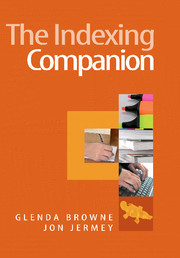Book contents
- Frontmatter
- Contents
- Foreword
- Preface
- 1 The Indexing Work Environment
- 2 Definitions and Standards
- 3 Planning Indexes
- 4 Concepts, Topics and Names
- 5 Selecting Terms
- 6 Controlled Vocabularies for Selecting Terms
- 7 Structuring Indexes
- 8 Quality Control and Interoperability
- 9 Specialised Source Material: Formats, Subjects and Genres
- 10 Software and Hardware
- 11 Threats and Opportunities in Indexing
- References
- Appendix: Selected websites
- Index
6 - Controlled Vocabularies for Selecting Terms
Published online by Cambridge University Press: 05 June 2012
- Frontmatter
- Contents
- Foreword
- Preface
- 1 The Indexing Work Environment
- 2 Definitions and Standards
- 3 Planning Indexes
- 4 Concepts, Topics and Names
- 5 Selecting Terms
- 6 Controlled Vocabularies for Selecting Terms
- 7 Structuring Indexes
- 8 Quality Control and Interoperability
- 9 Specialised Source Material: Formats, Subjects and Genres
- 10 Software and Hardware
- 11 Threats and Opportunities in Indexing
- References
- Appendix: Selected websites
- Index
Summary
WHEREAS MOST BOOK-STYLE indexing is a stand-alone process requiring only the item in hand, collection indexing is a long-term process dependent on the use of controlled vocabularies for maintaining consistency between indexers. In traditional bibliographic database and library indexing, this is done through authority files for names and thesauruses for subject terms. On intranets and websites the same basic tools may apply, although name authority control is less likely, and the controlled vocabulary may be a taxonomy used for navigation as well as for term selection. Ontologies and topic maps are important for more automated approaches to information access on the web. For an introduction see Warner (2002).
Name authority files
In library catalogues and other collection indexes, decisions about the form of names are recorded in authority files that list the preferred forms of names and alternative names from which references can be made. The alternative names may be earlier or later names, pseudonyms, or fuller forms of the name, and often include birth and death dates to distinguish different people with the same name. Authority files either provide cross-references or work behind the scenes enabling automatic searches for different forms of names.
Authority files may also include the source of information about the name. For example, Library of Congress Authorities (authorities.loc.gov) has a record for my great-great aunt, Alice M Browne, with a reference to Ryce, John, her pseudonym, quoting a book by RL Wolfe on nineteenth-century fiction that states: ‘John Ryce is the nom de plume of Alice M. Browne’.
- Type
- Chapter
- Information
- The Indexing Companion , pp. 79 - 86Publisher: Cambridge University PressPrint publication year: 2007



